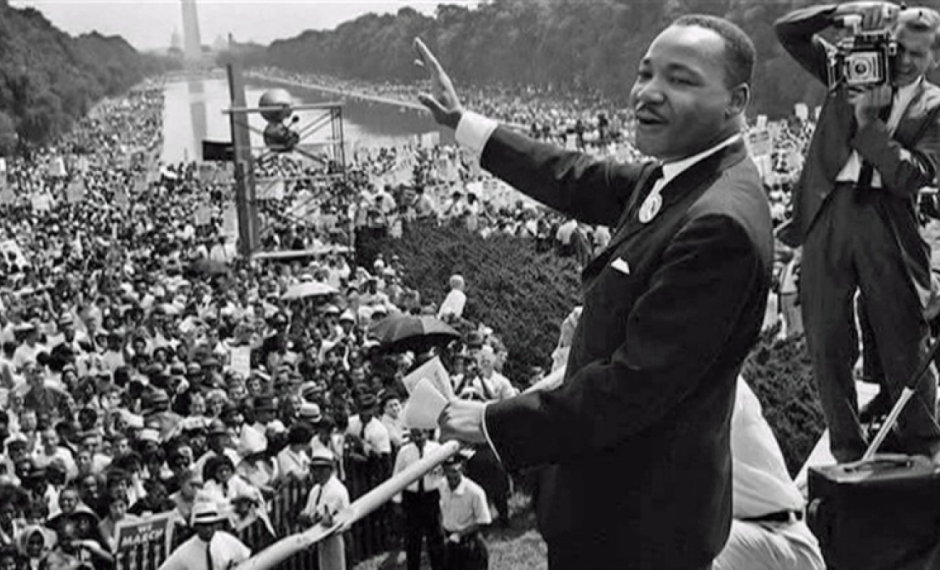
Speechwriting and delivering speeches has evolved over some three thousand years and copywriters can learn a great deal from the experiences of the past. Actually it's four things but one of the things is 'lists in three parts', so for consistency...
Speechwriting is the art of persuasion at its most visceral.
Yes you can write an ad, but can you persuade by standing in front of a bunch of people, armed only with your mouth and some words?
Tough gig.
Tough but with a long and illustrious lineage. From Greek and Roman times the art of rhetoric was prized. The best speakers rose to the top of society. Before the printed word, those who wanted to persuade had to get down amongst the people and use everything at their disposal to persuade. A clear line can be drawn from the likes of Socrates, Plato, Cicero, right the way through to Dr. Martin Luther King and Barack Obama today.
In the 1970s an academic called Max Atkinson decided to study the patterns and processes of successful speechwriting.
He discovered a great deal. Notable were four things that can maintain a speech and keep it fresh and interesting. He said these techniques prompted applause.
Alliteration (and assonance)
Alliteration, or a sequence of words that all start with the same letter, adds power to a speech. Assonance is then the repetition of particular sounds within words
Copywriters are often wary of glib alliteration, but there can be good examples.
John F Kennedy was a fan, with three alliterative examples (and one of assonance) in this sentence from his inaugural address (alliteration/assonance in bold):
"Let every nation know, whether it wishes us well or ill, that we shall pay any price, bear any burden, meet any hardship, support any friend, oppose any foe to assure the survival and the success of liberty."
Three part lists
The 'rule of three' is well known in copywriting, it's why Tony Blair's priority was: "Education, education, education", it's why, "A Mars a day helps you work, rest and play," and why Ian Dury sang about, "Sex and drugs and rock and roll."
There is also a slight modification to the rule that also works well, where one idea is repeated three times, the last repetition modified for emphasis. This is why Shakespeare's Richard the third said, "A horse, a horse, my kingdom for a horse."and why Martin Luther King said, "Free at last, Free at last, Thank God almighty we are free at last.”
Obama apparently used 29 three-part lists in 10 minutes during his famous victory speech from 2008.
Like De La Soul said, three is the magic number. The first two in the list set-up the links, the third item in the list confirms the idea. Lists of three are also easy to remember, more seems too long.
Contrasts
Using both a negative and a positive to get a particular reaction, most famously used by John F Kennedy when he said, "Ask not what your country can do for you, ask what you can do for your country."
This device also goes back a long way, with Shakespeare fond of the oxymoron (where contradictory terms come together), and used frequently to make particular points. Take Sigmund Freud's, "What a distressing contrast there is between the radiant intelligence of the child and the feeble mentality of the average adult."
Rhetorical questions
Used in common parlance, we know that a rhetorical question is one that we already know the answer to. And so it is.
Ronald Reagan was often critcised for being 'lightweight', but as he trained as an actor, his delivery was superb.
Take this, his very leading questions savagely took to pieces Jimmy Carter's legacy in 1980:
Can anyone look at the record of this Administration and say, "Well done"?
Can anyone compare the state of our economy when the Carter Administration took office with where we are today and say, "Keep up the good work"?
Can anyone look at our reduced standing in the world today and say, "Let's have four more years of this"?
If you prefer your speeches to be a little more rousing, here is Churchill:
“You ask, what is our policy? I can say: It is to wage war, by sea, land and air, with all our might and with all the strength that God can give us; to wage war against a monstrous tyranny, never surpassed in the dark, lamentable catalogue of human crime. That is our policy.
“You ask, what is our aim? I can answer in one word: It is victory, victory at all costs, victory in spite of all terror, victory, however long and hard the road may be; for without victory, there is no survival.”

Please login to comment.
Comments